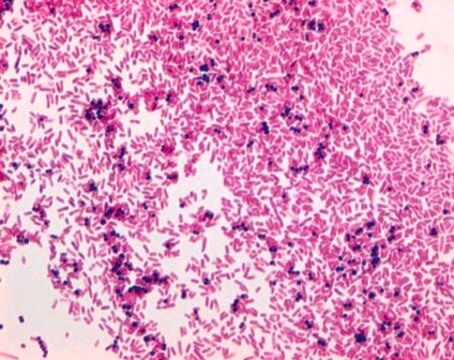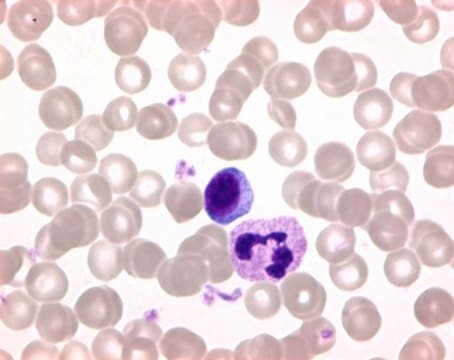Quality Level
form
liquid
color
light yellow
refractive index
n20/D 1.515-1.517
density
1.02 g/cm3 at 20 °C
application(s)
diagnostic assay manufacturing
hematology
histology
storage temp.
15-25°C
General description
Immersion Oil - for Microscopy, is of an oily nature and has a defined refractive index of about 1,516. It is important that the refractive index (nD) is about 1.5, similar to that of glass. This enables a homogeneous oil immersion to be achieved. Immersion media are used in conjunction with immersion objectivs and are located between the surface of the specimen and the lens of the microscope. Immersion oils practically eliminate light beam deflection so that the effectiveness of the lens is considerably increased. Immersion Oil - for Microscopy is produced from a natural component and developed, certified and registered as CE / IVD product. For more details, please see instructions for use (IFU). The IFU can be downloaded from this webpage.
1046990001 is in drip plastic bottle and 1046990100 is 100ml in glass bottle.
1046990001 is in drip plastic bottle and 1046990100 is 100ml in glass bottle.
Analysis Note
Refractive index (n 20/D): 1.515 - 1.517
Density (d 20 °C/ 4 °C): 1.0245 - 1.0265
Transmission (380 nm; 1 cm): ≥ 65 %
Transmission (400 nm; 1 cm): ≥ 78 %
Transmission (450 nm; 1 cm): ≥ 90 %
Fluorescence (as quinine at 365 nm): ≤ 1500 ppb
Viscosity (20 °C): 100 - 120 mPa∙s
Suitability for microscopy: passes test
Density (d 20 °C/ 4 °C): 1.0245 - 1.0265
Transmission (380 nm; 1 cm): ≥ 65 %
Transmission (400 nm; 1 cm): ≥ 78 %
Transmission (450 nm; 1 cm): ≥ 90 %
Fluorescence (as quinine at 365 nm): ≤ 1500 ppb
Viscosity (20 °C): 100 - 120 mPa∙s
Suitability for microscopy: passes test
Signal Word
Warning
Hazard Statements
Precautionary Statements
Hazard Classifications
Aquatic Acute 1 - Aquatic Chronic 2
Storage Class Code
10 - Combustible liquids
WGK
WGK 2
Certificates of Analysis (COA)
Search for Certificates of Analysis (COA) by entering the products Lot/Batch Number. Lot and Batch Numbers can be found on a product’s label following the words ‘Lot’ or ‘Batch’.
Already Own This Product?
Find documentation for the products that you have recently purchased in the Document Library.
Customers Also Viewed
Hongming Ma et al.
mBio, 11(2) (2020-03-12)
Although the pathogen recognition receptor pathways that activate cell-intrinsic antiviral responses are well delineated, less is known about how the host regulates this response to prevent sustained signaling and possible immune-mediated damage. Using a genome-wide CRISPR-Cas9 screening approach to identify
Our team of scientists has experience in all areas of research including Life Science, Material Science, Chemical Synthesis, Chromatography, Analytical and many others.
Contact Technical Service

